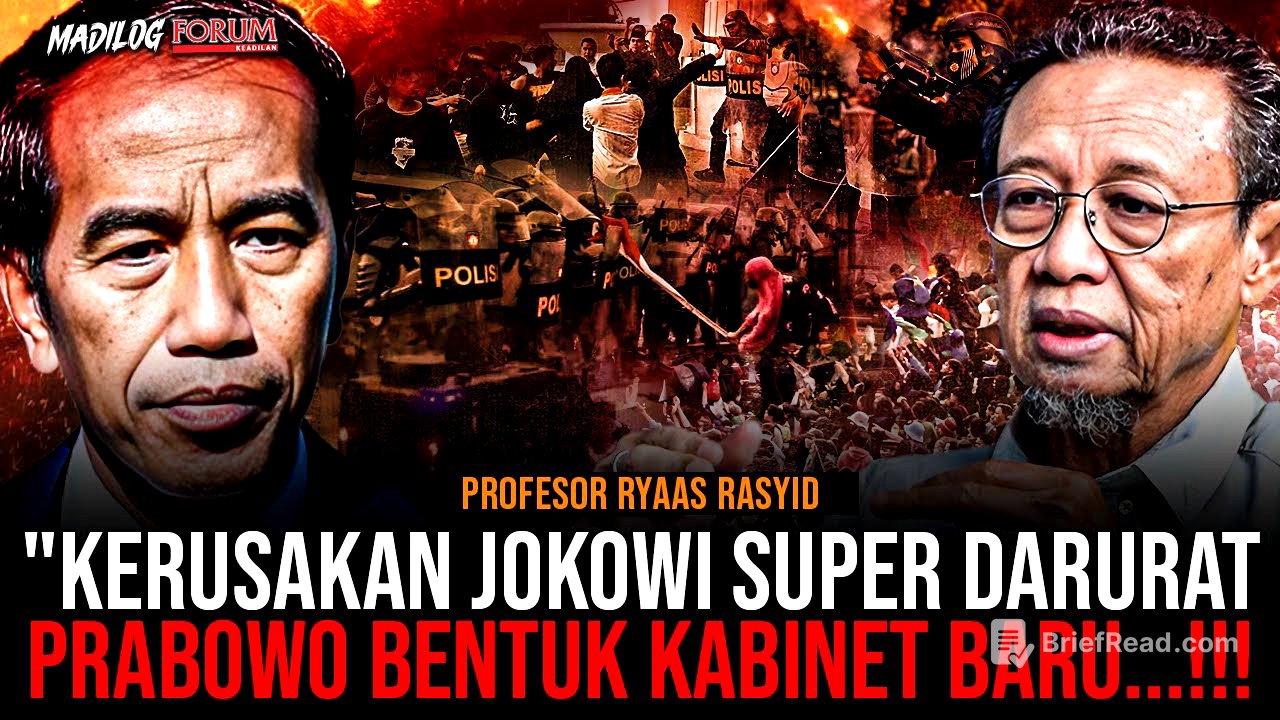TLDR;
This YouTube video features a discussion with Prof. Muhammad Rias Rasid, who shares his insights on the performance of the Indonesian House of Representatives (DPR), the state of regional autonomy, and potential solutions for improving governance in Indonesia. The conversation covers the DPR's role as an extension of political parties, the erosion of regional authority, the implications of coalition politics, and the need for political party reform.
- The DPR has become an extension of political parties, with members often acting as lackeys to party leaders.
- Regional autonomy has been significantly eroded, with the central government recentralizing authority and resources.
- Coalition politics often prioritize securing the president's government rather than fighting for the interests of the people.
- Political party reform is crucial for improving governance, with parties needing to focus on preparing and presenting good leaders.
- The election system needs to be reorganized to ensure that elected officials are known and trusted by the people.
Introduction [0:00]
The host introduces Prof. Muhammad Rias Rasid, an expert in government science, to discuss the state of the Indonesian House of Representatives (DPR) and potential reforms. The discussion aims to address concerns that the DPR has become an extension of executive power rather than a true representation of the people's interests.
The DPR as an Extension of Political Parties [3:36]
Prof. Rias Rasid observes that the DPR functions more as an extension of political parties, with members often acting as lackeys to party leaders. This dynamic diminishes the DPR's ability to represent the people's aspirations and fight for their interests. Party leaders hold significant authority, influencing the performance of DPR members. The professor recalls his time contributing to the drafting of DPR Law in 1998, which initially granted DPR members freedom from party control, a provision later removed, leading to the current situation where party dominance constrains the DPR's effectiveness.
Erosion of Regional Autonomy [10:35]
The discussion shifts to the erosion of regional autonomy, highlighting how the central government has been recentralizing authority and resources. Laws like the Job Creation Law have further diminished regional creativity and income sources. The professor notes that this trend began even before the Job Creation Law, with the central government withdrawing authority over sectors like mining, forestry, and maritime affairs. This recentralization has left regions struggling to find resources and has hindered their ability to implement local development programs.
Coalition Politics and Presidential Influence [20:53]
The conversation addresses the impact of coalition politics on the DPR, noting that coalitions often prioritize securing the president's government rather than fighting for the interests of the people. The professor suggests that during Jokowi's presidency, parties initially aimed to dictate to him but ultimately became dependent on him due to their own interests and need for cabinet positions. This dynamic has led to a situation where the president dictates to the coalition, reversing the intended power dynamic.
The Need for Political Party Reform [44:59]
The discussion emphasizes the crucial need for political party reform to improve governance in Indonesia. Political parties must focus on preparing and presenting good leaders at all levels, rather than engaging in corrupt practices. The professor argues that the source of political problems lies in political parties, which must be reformed to ensure they nominate competent and ethical leaders. He suggests that a new kind of awareness needs to arise from party leaders, but also acknowledges the difficulty of hoping for such awareness in the current conditions.
Reorganizing the Election System [56:02]
The professor proposes reorganizing the election system as a priority step for improving legislative governance. He advocates for a district system where the person chosen is someone known and trusted by the local community. This system would simplify the calculation process and reduce the potential for manipulation. Additionally, he suggests limiting the grounds for recall to major ethical violations or criminal acts, allowing DPR members to prioritize their loyalty to the country and nation over the party.
Conclusion [59:42]
The video concludes with a summary of the key points discussed, emphasizing the need for accountability in parliament and the importance of people's representatives serving as the voice of the people rather than the echo of the ruler. The host shares quotes from Maulana Jalaluddin Rumi, Nelson Mandela, and Thomas Jefferson to underscore the principles of justice, service, and freedom in governance.









